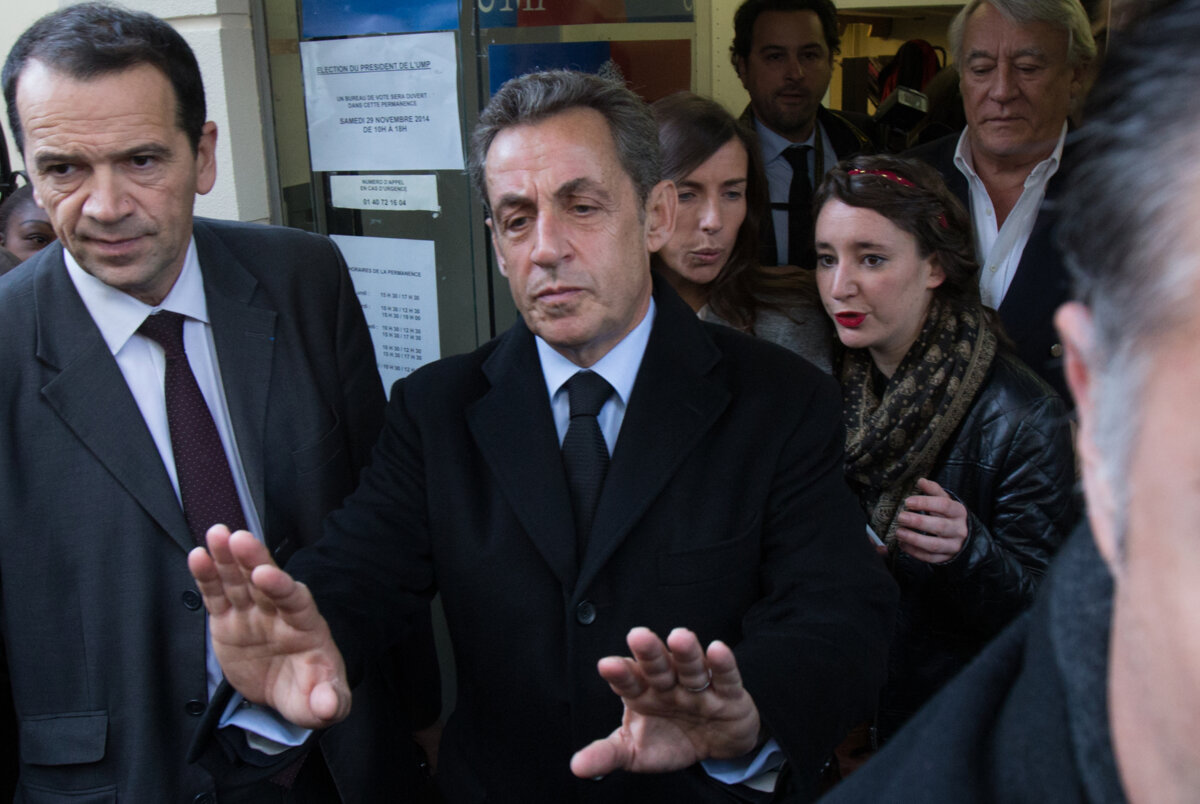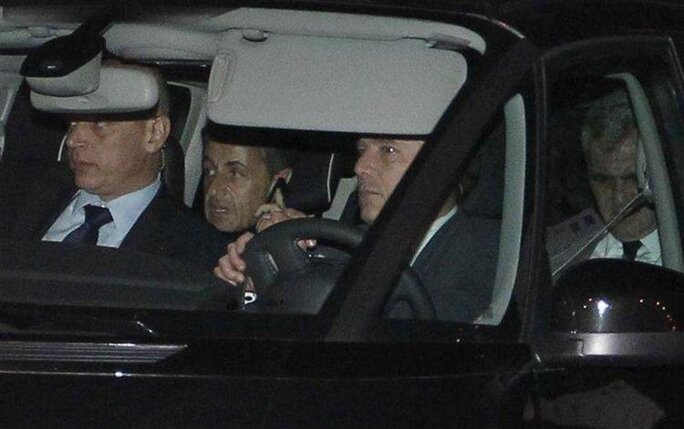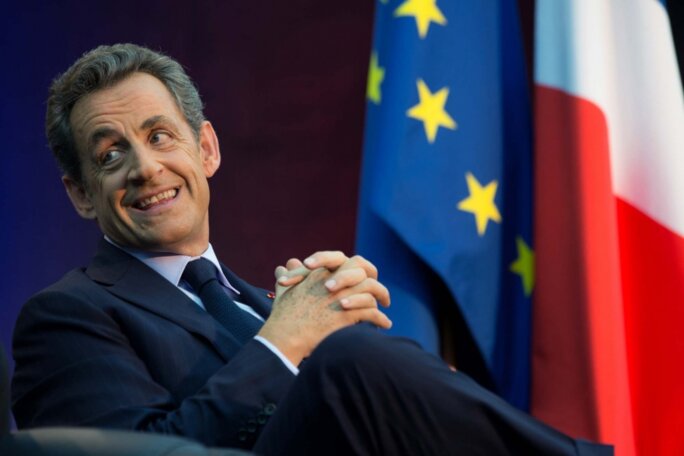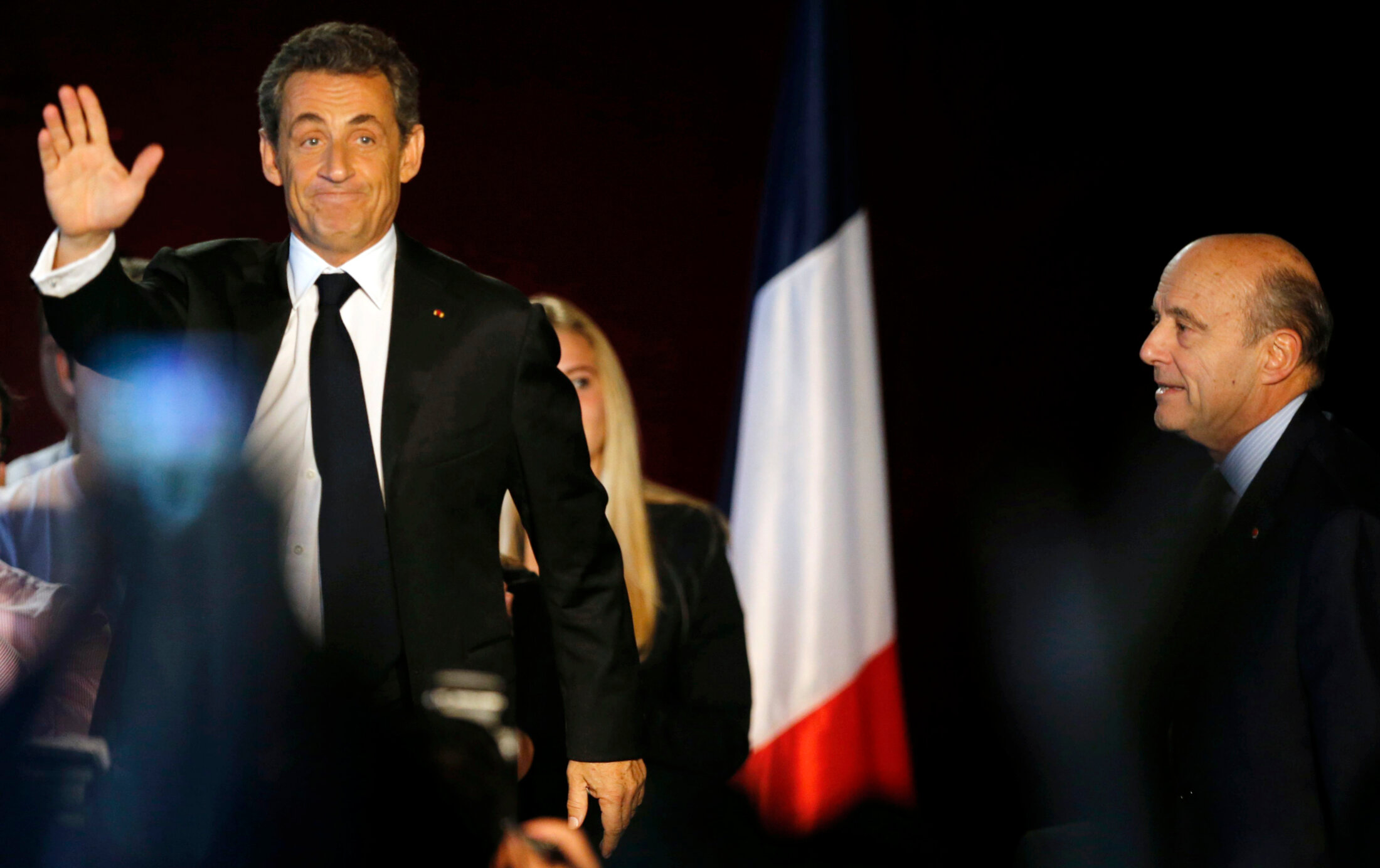What was bound to happen has happened. Nicolas Sarkozy was elected president of the conservative opposition UMP party on Saturday, collecting 64.5% of votes cast, against 29.18% for his principle rival Bruno Le Maire, and 6.32% for the only other candidate, Hervé Mariton.
“As of Monday I will meet with the principle leaders of our political family in order to create the conditions for the widest unity,” Sarkozy said in a statement posted on Facebook. “This vote marks a new departure for our political family.”
Of the UMP’s 268,000 members, 155,801 took part in the elections which Sarkozy had long been tipped to win, essentially because of his longstanding popularity with a hard core of party militants. Sarkozy’s score on Saturday was well below that which he obtained when he won the leadership contest in 2004, capturing 85.09% of the vote. This second bid for the post was marked by a lackluster campaign in which he presented but a ghost of a programme and slipped up with a number of strategic mistakes.

Enlargement : Illustration 1

The UMP may well represent the smallest of his concerns at the moment, but he needed the post as its president to remain a contender for the 2017 presidential elections when, he hopes, revenge will be his. From that angle, his victory this weekend is troubling. It demonstrates that one can take the reins of France’s principal opposition party without much enthusiasm or policy proposals – but with a few strained smiles, some reheated hate and while being at the centre of a number of judicial investigations.
The internal campaign for the leadership contest served as a warm-up for the real race Sarkozy eyes: that of the primaries in 2016 when the UMP will choose its candidate for the 2017 presidential elections. That is what is really at stake here, and the only thing to which he is turned. Rebuild the party? Give it an ideological framework? Unite its leading members? Put its finances right? Why not, of course – as long as all this serves Sarkozy’s ambitions of returning to the Elysée Palace. But the end of the tunnel is a long, long way off yet, and there are many obstacles along the way.
What with the judicial probes that target him and his entourage, the political competition that’s sharpening its weapons and his own lack of ideas, Sarkozy has a lot to be getting on with.

Enlargement : Illustration 2

The series of judicial investigations that concern him is undoubtedly a major motivation for his return to active politics and his future bid for the presidency. But part of his strategy in doing so has left even some of his close allies sceptical. For by taking over the UMP he imagined this would serve as something of a shield against the different magistrates closing in on him, but in fact he has placed himself in yet another situation of conflict of interest.
Because as the party’s new leader, he will have to manage the explosive Bygmalion affair, an internal corruption and fraud scandal for which three of the party’s officials have already been placed under investigation (a French legal status one step short of being charged) and which caused the downfall of the last UMP president, Jean-François Copé.
The case centres on a system of fake invoicing by communications firm Bygmalion during Sarkozy’s presidential election campaign in 2012. Bygmalion unlawfully billed the UMP rather than Sarkozy's election team for work they did organising campaign rallies, apparently to avoid the Sarkozy campaign breaching strict rules on how much presidential candidates can spend.
During the leadership campaign, Sarkozy and his entourage gave comments on the case which were as grotesque as they were untrue. “I learnt about the name Bygmalion a long time after the presidential campaign,” he said in an interview with television channel France 2. Shortly after, Sarkozy’s longstanding friend and political aide, Brice Hortefeux, who served Sarkozy’s 2012 election campaign, said: “I didn’t know this company…Pygmalion, Bygmalion, I don’t know what.” Who could believe such accounts? But even if he pretends to take the affair lightly, the new leader of the UMP will in fact have to take it very seriously indeed. As the principle benefactor of the fake invoicing at the heart of the affair, to which the UMP is a civil party, he could face charges of ‘illegal funding of an electoral campaign’.
Then there is also the case of the fine of 363,615 euros Sarkozy received after his 2012 election campaign accounts were rejected by Constitutional Council, and which the UMP unlawfully paid in his place. That is now the subject of a judicial investigation opened into ‘abuse of trust’, ‘complicity in a crime’ and ‘receiving the proceeds of crime’. The situation, following Sarkozy’s election as head of the UMP, is as follows: former presidential candidate Nicolas Sarkoy finds himself accused by UMP president Nicolas Sarkozy of having despoiled himself!
The coming two years are going to be busy for him on a legal front. On top of the investigations into the 2012 campaign accounts, there are also judicial probes into suspected Libyan funding of his 2007 election campaign, and the case of his alleged corruption of a senior judge.
Sarkozy has forgotten too soon he is the divider
For the past two years, since his election defeat by François Hollande, the former French president has given matters much thought. Not matters concerning a future vision for France, as he claims, but rather at how he can shake off all the judicial investigations that stick to him like plasters. This almost full-time preoccupation is problematic for the newly-elected UMP leader, who now must build a credible alternative programme for his party.
From the outset, Nicolas Sarkozy believes his personal self is, in itself, a sufficient programme for his return to power. After all, why call oneself into question when you spend months travelling the world to be applauded at highly-paid conferences? During the UMP leadership campaign, his aides regularly repeated that ideas would follow and that it was normal that there were policy issues yet to be defined.
His public meetings revealed the weakness of what he still dares to call his “convictions”, with his catering to the ultra-right crowds on the Riviera, and to the anti-gay marriage crowds in Paris. Along with playing around with the truth, there were incidents where the sorts of comments he is happy to make off the record slipped onto the record. During a questions and answers session at a public meeting in the Paris suburb of Boulogne-Billancourt on November 25th, he referred to Rachida Dati, the first justice minister of his 2007-2012 presidency. “Dati, with father and mother Algerian and Moroccan, to talk about penal policy that made sense,” he said.

Enlargement : Illustration 3

Whether it be on the issue of same-sex marriage, or that of immigration, the former president seems completely disconnected with current times – all to the delight of his main rival in the 2016 UMP primaries, mayor of Bordeaux and former prime minister Alain Juppé. “Sarkozy spoke ironically about my age, called me an old man, but with his slip-up on gay marriage, he’s the one who appears to be old-fashioned and conservative,” Juppé commented in private, according to investigative weekly Le Canard Enchaîné, after Sarkozy’s pledge to repeal the same-sex marriage law.
Over the past few months, Juppé has become Sarkozy’s new pet hate. On paper, the 69-year-old has little in his favour in the fight against Sarkozy to become the UMP’s presidential candidate. Many remember clearly his conviction in 2004 of misusing public funds in a fake jobs scam at Paris City Hall where he served as deputy to mayor Jacques Chirac. On appeal, Juppé received a 14-month suspended jail sentence and was stripped of his right to stand in an election for one year. Then there is the fact that when presidential elections are held in 2017, he will be almost 72.
Also, his rapprochement with centre-right veteran François Bayrou upsets all those in the UMP who have still not swallowed Bayrou’s support for socialist François Hollande in the 2012 elections.
Yet his star is on the rise since announcing his participation in the primaries – a contest which Sarkozy wanted to avoid but which Juppé forced upon him. Since that August announcement, Juppé has been hard at work drumming up support within and around the party, including addressing its younger generation which is more inclined towards Juppé’s moderate style in comparison to Sarkozy’s confrontational one.

Enlargement : Illustration 4

During his leadership campaign, Sarkozy held a public meeting of UMP members in Juppé’s electoral fiefdom of Bordeaux. The crowd of Sarkozy supporters jeered Juppé when he appeared on stage, an incident which was widely commented in the media, notably because Sarkozy did nothing to stop the booing. Sarkozy lost points after that incident, which represented yet another strategy mistake in his campaign. Because by staying seated in his chair that evening, doing nothing to calm down the jeering crowd, Sarkozy demonstrated to all that he was incapable of bringing peace and unity to the party. Worse still, he was actually succeeding with the opposite.
The former president might have regained his party throne, but there is a strange echo along the corridors of the UMP’s headquarters on the rue de Vaugirard in Paris. Just a few months ago, Sarkozy’s loyal friend and servant Brice Hortefeux commented: “I make a bet that, in two years’ time, everybody will have returned to the Sarkozy [political] family.” But it would appear he has lost his bet earlier than that. During the UMP race, Sarkozy gathered the official support of 80 UMP Members of Parliament, which was just some 30 more than his rivals Bruno Le Maire and Hervé Mariton.
Meanwhile, some of his most solid allies – his former ministers Nadine Morano, Christian Estrosi and Nathalie Kosciusko-Morizet (who was also his 2012 election campaign spokeswoman) and even his advisor and speechwriter Henri Guaino – are taking a certain distance from him. True to form, they supported his campaign for the UMP leadership, but each of them, away from the microphones, made disparaging remarks about Sarkozy’s incapacity to properly return to the political battle.
In an interview last week with French daily Le Figaro, before his election as UMP chief at the weekend, the former president said if elected his first challenge “will be to succeed in bringing the [party’s political] family together and to make sure that the least difference between its members does not just as soon translate itself into a presentation of divisions that we cannot, in any way, allow ourselves”. Nicolas Sarkozy appears to have forgotten a little too soon that it is he who has divided everyone.
-------------------------
- The French version of this article can be found here.
English version by Graham Tearse


